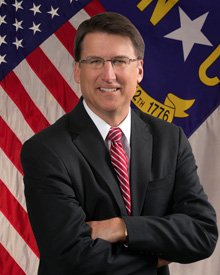Governor: Fund Higher Ed on 'How Many Butts Can Get Jobs'
Posted on Feb. 11, 2013North Carolina’s new governor took office in January with a tough assignment: Figure out how to cut the state’s unemployment rate from about 9 percent, one of the highest state jobless rates in the U.S.
Before the month was out, Pat McCrory had indicated he sees at least part of the solution in how higher education is funded: “Right now, we pay based on how many students you have, not how many jobs you are getting people into,” he said on radio commentator Bill Bennett’s nationally syndicated show. “I’m looking at legislation right now — in fact, I just instructed my staff yesterday to go ahead and develop legislation — which would change the basic formula in how education money is given out to our universities and our community colleges.” His funding philosophy, he said, is “not based on butts in seats but on how many of those butts can get jobs.”
In the short interview, McCrory questioned the value of a liberal arts education in a conversation about his plans to seek legislation that would change the way public higher education is funded in the state. McCrory said, as he had on the campaign trail, that the emphasis in the state’s universities should be on teaching that leads directly to jobs.
Also during the broadcast, McCrory and Bennett, who was U.S. secretary of education from 1985 to 1988, criticized gender studies as an example of a curriculum of questionable value. “If you want to take gender studies that’s fine, go to a private school and take it,” McCrory said. “But I don’t want to subsidize that if that’s not going to get someone a job.” Women’s and gender studies is an academic department at UNC.
McCrory, who majored in political science and education at Catawba College, said in the same conversation that he does “believe in liberal arts education.”
That reassurance didn’t tone down the reaction from Carolina and elsewhere.
Faculty Chair Jan Boxill, a philosophy professor, told The Daily Tar Heel: “Education is more than just training people for jobs today. We help students become problem-solvers and creators for the jobs of the future. If we want to retain our status as educators in the state, nation and world, I think reasonable people will see that universities are where the innovators are.”
Sociology professor Andrew Perrin said: “The reality is that nobody has a clear sense of what good jobs will require 10, 20 or 30 years down the road. A strong, diverse and challenging liberal arts education like the one we provide at Chapel Hill is the best possible resource for dealing with the reality of uncertain futures and the changing economy, society and world.”
Holly Brugger, a Carolina senior majoring in psychology and women’s and gender studies, wrote to the DTH that in her last semester she is a paid research assistant in her field at UNC Hospitals. “I do not think that my fellow women’s and gender studies majors and I should have to go to a ‘private school’ to attain a ‘gender studies’ degree, when we are as productive to society as the majority of our peers,” she wrote.
Shortly after the Bennett show appearance was publicized, McCrory spokespeople said that his remarks were not intended as an attack on UNC and that the proposed overhaul of funding to the universities was part of a comprehensive rethinking of the way education is funded in the state at every level.
UNC System President Thomas Ross ’75 (JD) said his office was committed to working with McCrory. He added in a statement, “The University’s value to North Carolina should not be measured by jobs filled alone.”
In a letter dated Feb. 7 and signed by 14 members of UNC’s Faculty Executive Committee, McCrory was invited to “visit our campus so that you may get to know us – and what we do – better.” The faculty members said they wrote “to underscore the extraordinary value of the liberal arts curriculum that is the core of our great university.”
The women’s and gender studies department’s website at UNC featured responses to McCrory’s statements, noting: “We have been heartened by the outpouring of support that the Department of Women’s and Gender Studies received from all corners and directions. We are rightfully proud of the accomplishments of all our current and past students. We have received numerous testimonies to the value and employment options of all the students who either majored in WGST or who took courses with us.”
The department’s website also cited a statement from the department’s chair, Joanne Hershfield, from Inside Higher Ed in late January: “Our department’s graduates do not have any problem finding employment upon graduation, with many going into public health, education, law, public policy, business and nonprofit work. … One even has a yacht business.”

